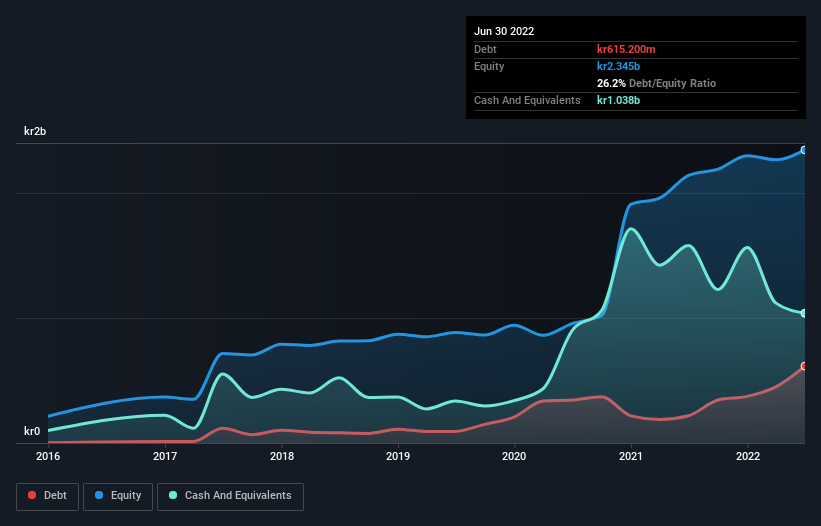These 4 Measures Indicate That Boozt (STO:BOOZT) Is Using Debt Extensively

Some say volatility, rather than debt, is the best way to think about risk as an investor, but Warren Buffett famously said that 'Volatility is far from synonymous with risk.' So it might be obvious that you need to consider debt, when you think about how risky any given stock is, because too much debt can sink a company. Importantly, Boozt AB (publ) (STO:BOOZT) does carry debt. But is this debt a concern to shareholders?
Why Does Debt Bring Risk?
Debt is a tool to help businesses grow, but if a business is incapable of paying off its lenders, then it exists at their mercy. In the worst case scenario, a company can go bankrupt if it cannot pay its creditors. While that is not too common, we often do see indebted companies permanently diluting shareholders because lenders force them to raise capital at a distressed price. Of course, the upside of debt is that it often represents cheap capital, especially when it replaces dilution in a company with the ability to reinvest at high rates of return. The first thing to do when considering how much debt a business uses is to look at its cash and debt together.
View our latest analysis for Boozt
What Is Boozt's Debt?
The image below, which you can click on for greater detail, shows that at June 2022 Boozt had debt of kr615.2m, up from kr218.1m in one year. However, it does have kr1.04b in cash offsetting this, leading to net cash of kr422.8m.

How Healthy Is Boozt's Balance Sheet?
According to the last reported balance sheet, Boozt had liabilities of kr1.68b due within 12 months, and liabilities of kr882.6m due beyond 12 months. On the other hand, it had cash of kr1.04b and kr104.8m worth of receivables due within a year. So its liabilities outweigh the sum of its cash and (near-term) receivables by kr1.42b.
While this might seem like a lot, it is not so bad since Boozt has a market capitalization of kr4.10b, and so it could probably strengthen its balance sheet by raising capital if it needed to. However, it is still worthwhile taking a close look at its ability to pay off debt. Despite its noteworthy liabilities, Boozt boasts net cash, so it's fair to say it does not have a heavy debt load!
In fact Boozt's saving grace is its low debt levels, because its EBIT has tanked 25% in the last twelve months. When a company sees its earnings tank, it can sometimes find its relationships with its lenders turn sour. There's no doubt that we learn most about debt from the balance sheet. But ultimately the future profitability of the business will decide if Boozt can strengthen its balance sheet over time. So if you're focused on the future you can check out this free report showing analyst profit forecasts.
But our final consideration is also important, because a company cannot pay debt with paper profits; it needs cold hard cash. Boozt may have net cash on the balance sheet, but it is still interesting to look at how well the business converts its earnings before interest and tax (EBIT) to free cash flow, because that will influence both its need for, and its capacity to manage debt. During the last three years, Boozt burned a lot of cash. While that may be a result of expenditure for growth, it does make the debt far more risky.
Summing Up
Although Boozt's balance sheet isn't particularly strong, due to the total liabilities, it is clearly positive to see that it has net cash of kr422.8m. Despite its cash we think that Boozt seems to struggle to grow its EBIT, so we are wary of the stock. When analysing debt levels, the balance sheet is the obvious place to start. But ultimately, every company can contain risks that exist outside of the balance sheet. For example, we've discovered 3 warning signs for Boozt (1 is significant!) that you should be aware of before investing here.
If you're interested in investing in businesses that can grow profits without the burden of debt, then check out this free list of growing businesses that have net cash on the balance sheet.
If you're looking to trade Boozt, open an account with the lowest-cost platform trusted by professionals, Interactive Brokers.
With clients in over 200 countries and territories, and access to 160 markets, IBKR lets you trade stocks, options, futures, forex, bonds and funds from a single integrated account.
Enjoy no hidden fees, no account minimums, and FX conversion rates as low as 0.03%, far better than what most brokers offer.
Sponsored ContentValuation is complex, but we're here to simplify it.
Discover if Boozt might be undervalued or overvalued with our detailed analysis, featuring fair value estimates, potential risks, dividends, insider trades, and its financial condition.
Access Free AnalysisHave feedback on this article? Concerned about the content? Get in touch with us directly. Alternatively, email editorial-team (at) simplywallst.com.
This article by Simply Wall St is general in nature. We provide commentary based on historical data and analyst forecasts only using an unbiased methodology and our articles are not intended to be financial advice. It does not constitute a recommendation to buy or sell any stock, and does not take account of your objectives, or your financial situation. We aim to bring you long-term focused analysis driven by fundamental data. Note that our analysis may not factor in the latest price-sensitive company announcements or qualitative material. Simply Wall St has no position in any stocks mentioned.
About OM:BOOZT
Boozt
Sells fashion, apparel, shoes, accessories, kids, home, sports, and beauty products online.
Flawless balance sheet and undervalued.
Similar Companies
Market Insights
Community Narratives


